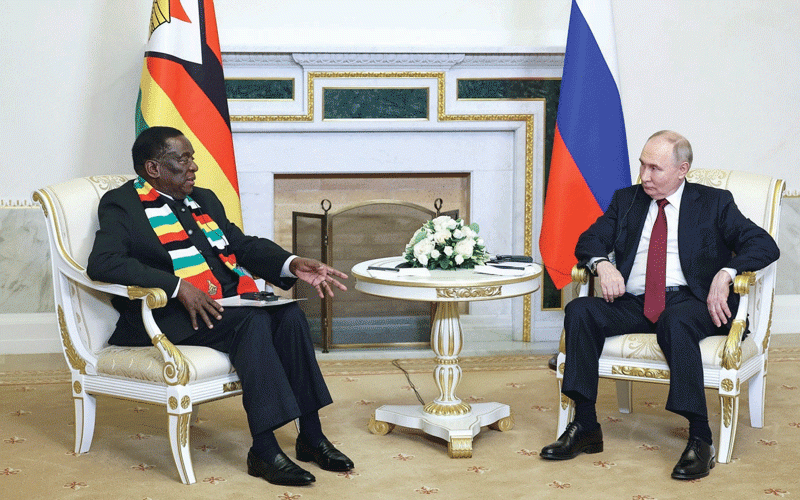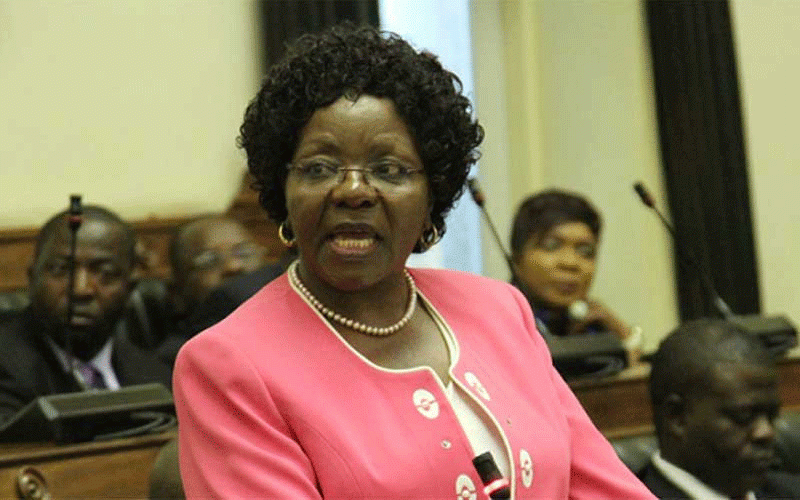
PRESIDENT Emmerson Mnangagwa administration’s re-engagement drive with the West, particularly Washington, is off the rails, amplified by his recent remarks during a meeting with Russian leader Vladimir Putin.
A fortnight ago, Mnangagwa torched a diplomatic storm with neighbouring Zambia when he told Putin that Washington’s blossoming cooperation with Lusaka had left Harare increasingly isolated.
These are the sought of insights normally said in confidence. But the Zimbabwean president’s remarks were made public in Russia.
The US’s dalliance with Zambia and Malawi has rattled Zimbabwe’s political leadership, which has been blacklisted by Washington over what adversaries see as undemocratic tendencies.
Mnangagwa, the only African leader invited by Putin to attend the Africa-Russia summit, boldly told the Russian leader Harare, like Moscow, was suffocating under the weight of US imposed sanctions.
Ironically, Mnangagwa’s administration, which has squandered the golden opportunity to normalise relations with the West ever since storming to power in 2017, has vainly attempted to maintain that its re-engagement efforts with the US are bearing fruit.
On the global stage, Russia, which is locked up in a deadly war with Ukraine that was triggered by its invasion of the European country has been slapped by a salvo of sanctions targeting its oligarchs and foreign assets.
Russian assets worth billions of dollars in Europe and the US have been frozen and Western leaders are contemplating transferring them to Kiev to support its war effort against the Russian invasion.
- Village Rhapsody: Zimbabwe desperately needs healing
- Zim tycoons elevate offspring to key roles
- Village Rhapsody: Zimbabwe desperately needs healing
- Zim tycoons elevate offspring to key roles
Keep Reading
Similarly, the US this year upgraded its Executive Orders sanctions thrust with the Global Magnitsky sanctions framework which saw Mnangagwa, his wife Auxillia and 10 members of his inner circle being prohibited to travel to the US.
The Global Magnitsky sanctions also encompass asset freezes.
While Zimbabwe and Washington’s relations continue to deteriorate, US relations with Zambia are on an upswing, cultivated by Lusaka’s growing commitment to deepen its democracy, uphold human rights and encourage the growth of a robust civic society.
Though China and Russia have continued to prop up Mnangagwa’s administration through financial, military and humanitarian aid, while ignoring Harare’s appalling human rights record, the token support has not lifted debt ridden Zimbabwe from an acute economic crisis.
The US, through the Zimbabwe Democracy Recovery Act (Zidera) of 2003, succinctly outlines the signposts that Harare must follow including restoring the rule of law and curtailing rampant public corruption if it is to repair relations with the US.
However, for over two decades now, Zimbabwe has ignored embracing far reaching political and economic reforms while gravitating towards countries like Russia, China and Belarus, whose human rights track records have been questioned by some major powers.
This has further isolated Harare from the international community.
The US has since pulled out of the African Development Bank (AfDB) initiative to address Zimbabwe’s longstanding debt crisis which has frustrated the southern African country from unlocking fresh credit from multilateral creditors. Washington’s stance to pull out of the debt talks deals Zimbabwe’s efforts to clear its obligations a heavy blow.
As expected, the US also condemned Zimbabwe’s disputed elections held in 2023 which the Southern Africa Development Community (Sadc) electoral observer mission discredited for failing to satisfy international practices governing democratic elections.
In the aftermath of Sadc’s observer mission report, delivered by former Zambian vice president Nevers Mumba, Mnangagwa’s Zanu PF party excoriated Zambia and the bloc for being used as pawns by the West to achieve regime change in Zimbabwe.
Political analyst Reuben Mbofana noted that Mnangagwa's remarks further escalated already strained relations between Zimbabwe and the US.
“Mnangagwa’s remarks to Putin have turned an already complicated relationship between Zimbabwe and the US to a whole new level of complexity. I do not think Mnanngagwa will be able to undo the damage he has caused. He may have to send a delegation to the US to clarify his reckless statements.
“This may start with Foreign Affairs minister Fredrick Shava engaging with the US Ambassador to Zimbabwe. This will hopefully open the way to more dialogue.”
Another political analyst Ricky Mukonza agreed that Mnangagwa shot himself in the foot in his strategy to re-engage with the US.
Mukonza said: “The remarks present President Mnangagwa as falling short on understanding diplomatic etiquette. The remarks are worsening an already strained US -Zimbabwe relationship.
“Zimbabwe may need to engage the US through diplomatic channels to explain the situation and its position. However, the problem between the US and Zimbabwe is much more complicated than what is portrayed by the Russian incident. The Zimbabwean State has issues which may not be easy to fix,” he added.







